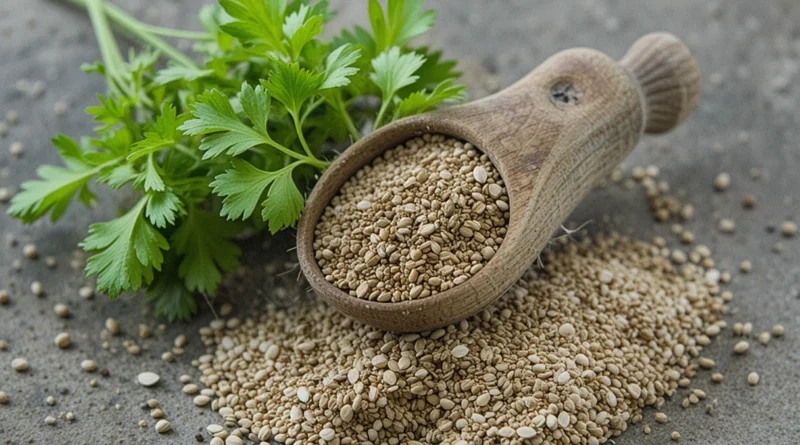Health Benefits of Coriander Seeds
Coriander seeds (Coriandrum sativum) are both an acclaimed culinary spice and medicinal herb, offering relief for urinary tract infections as well as improving cardiovascular wellbeing.
Coriander seeds should be stored in a cool, dark location away from heat and moisture; glass jars with tight-fitting lids provide optimal conditions.
Health Benefits and Uses
Coriander seeds, also referred to as dhania or cilantro, are a staple ingredient of Indian cuisine, both whole or ground into powder form. Yet despite being such a crucial element of Indian cooking, cilantro itself may not be widely recognized for its health benefits – most of the nutrition found within its seeds lies within these as this is where its true power lies.
Coriander seeds contain phytochemicals and compounds such as linalool, phenolic acids, flavonoids and alkaloids that have been demonstrated to possess anti-inflammatory, antioxidant, antimicrobial, anticarcinogenic and antidepressant effects. Furthermore, these same components have antihyperglycemic effects which regulate blood sugar levels while helping manage diabetes effectively.
Coriander is packed with minerals such as calcium, potassium, magnesium, iron and zinc; plus vitamins A, C and K. Coriander has numerous health benefits for digestive issues including aiding digestion, relieving gas pains and relieving stomach discomfort and bloating. Furthermore, its antiparasitic effects may help kill any parasites present that are causing problems in your system.
Cilantro is an excellent source of fibre, helping us feel full for longer and reducing appetite while aiding weight loss. Furthermore, it contains vitamin A which supports eye health and the immune system as well as folate for immune support and folate supplementation. Studies have shown that eating plenty of cilantro could potentially lower risk factors for neurodegenerative disorders like Alzheimer’s, Parkinson’s and Multiple Sclerosis due to its anti-inflammatory properties.
Nutritional Profile
Coriander seeds (Coriandrum sativum) are tiny round seeds with a combination of sweet, citrusy, and peppery flavors that combine. Coriander is widely used throughout India, Middle Eastern cuisines as well as Russian dark rye bread as an ingredient or marinade base; its spices also often make appearances in spice blends.
Seeds contain high concentrations of Vitamin C and storehouses of essential B-complex vitamins such as thiamin, riboflavin and niacin; additionally they’re an excellent source of fiber.
Coriander seeds and leaves (commonly referred to as cilantro) provide powerful health benefits that include lowering blood sugar, combatting infections, supporting heart, brain, eye, and digestive health, as well as easy incorporation into daily diet. Both cilantro and coriander seeds are convenient additions.
Animal studies suggest that coriander seeds and oil from this herb have blood-sugar-reducing effects, which may help bring down glucose levels when taking medication for diabetes. They stimulate insulin secretion and enhance carb metabolism (4); coriander seeds have also been proven to inhibit platelet aggregation risk factors as well as widen your blood vessels while simultaneously decreasing triglyceride and cholesterol levels in rats (5).
Common Uses
Coriander seeds are widely used as an aromatic spice component in aromatic mixtures like garam masala. Whole or ground seeds can also be used to flavor pickles and chutneys. In cocktails, crushed or mushed coriander seeds add unique citrus and botanical notes for cocktails that utilize them.
Coriander seeds contain phenolic compounds which act as powerful antioxidants to combat against oxidative stress that contributes to chronic diseases, helping regulate blood sugar and relieve symptoms such as heartburn, bloating and flatulence. These properties may also aid with weight control by aiding blood sugar regulation as well as improving digestive issues like heartburn, bloating and flatulence.
As with other spices, coriander seeds must be stored in an airtight container to preserve flavor and aroma for at least a year after purchasing them. Both whole and ground coriander seeds can keep their aroma intact with proper storage methods.
Coriander seeds can also be used as a hair conditioner. When combined with water and heated, they make an effective final rinse after shampooing to help condition and strengthen hair. They may also be used as the basis for homemade mouthwash to combat bad breath. Coriander’s sedative qualities may help relieve insomnia or anxiety thanks to its essential oils which have soothing effects on both body and mind.
Storage
Coriander seeds have the ability to remain fresh for an extended period when stored properly, though it’s essential that they be regularly checked for spoilage and consumed before they go bad. A simple sniff test can help determine whether the seeds remain potency enough to be consumed safely.
Store coriander seeds in high-quality packaging that prevents contamination. Selecting sealed plastic bags or jars with tight-fitting lids is ideal, keeping the seeds away from air exposure and other elements that could compromise their quality. Furthermore, opting for organic coriander seeds ensures you consume healthy herbs free from chemicals.
Vacuum sealing coriander seeds is another simple way to extend their shelf life and preserve their aroma and flavor, helping extend their shelf life by eliminating air from their packaging and slowing the oxidation process. By vacuum sealing, aroma and flavor are preserved more effectively while helping ensure maximum shelf life of these gourmet seeds!
If you’re cultivating coriander for its leaves, harvest them regularly as a cut-and-come-again crop to encourage continued growth while delaying flowering. Hot weather can trigger premature bolting (premature blooming), so regular watering during the summer is advised if possible to delay this happening prematurely. Alternatively, grow it indoors in a greenhouse or windowsill before transplanting outside after the last frost date has passed.
